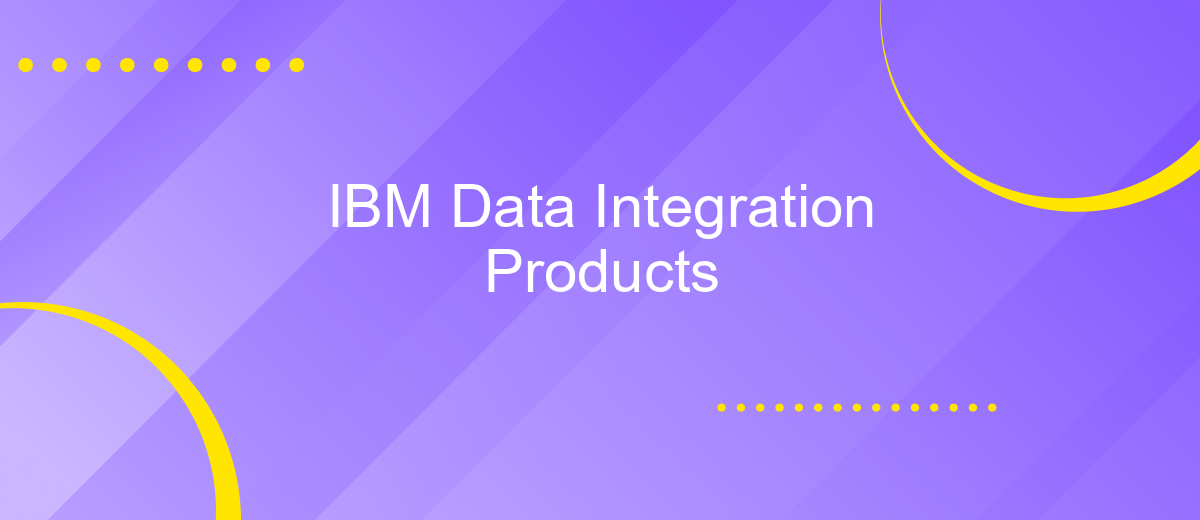IBM Data Integration Products
IBM Data Integration Products offer a comprehensive suite of tools designed to streamline and enhance the process of integrating diverse data sources. These solutions enable businesses to efficiently manage, transform, and analyze data, ensuring seamless data flow across various platforms. With robust features and scalability, IBM's data integration products empower organizations to make data-driven decisions and achieve operational excellence.
Overview of IBM Data Integration Products
IBM offers a comprehensive suite of data integration products designed to help organizations manage, transform, and integrate their data across various platforms and environments. These products enable seamless data movement, providing robust solutions for data warehousing, analytics, and real-time data processing. By leveraging IBM's data integration tools, businesses can ensure data consistency, quality, and accessibility, driving better decision-making and operational efficiency.
- IBM InfoSphere DataStage: A powerful ETL tool for designing, developing, and running jobs that move and transform data.
- IBM InfoSphere Information Server: An integrated platform for data integration, data quality, and data governance.
- IBM Data Replication: Real-time data replication and synchronization across heterogeneous databases.
- IBM Cloud Pak for Data: A unified data and AI platform that integrates data management, governance, and analytics.
These products are designed to address the diverse data integration needs of modern enterprises, ensuring that data is available, accurate, and secure. Whether dealing with on-premises systems, cloud environments, or hybrid architectures, IBM's data integration solutions provide the flexibility and scalability required to handle complex data landscapes.
Key Features and Benefits

IBM Data Integration Products offer a comprehensive suite of tools designed to streamline data management and integration processes. These products provide robust capabilities for data transformation, cleansing, and migration, ensuring seamless data flow across various systems and applications. With advanced features like real-time data synchronization and extensive support for multiple data sources, businesses can achieve greater efficiency and accuracy in their data operations. The intuitive user interface and powerful automation options make it easy for users to configure and manage integrations without extensive technical expertise.
One of the standout benefits of IBM Data Integration Products is their scalability and flexibility, accommodating the needs of both small businesses and large enterprises. The products are designed to handle high volumes of data and complex integration scenarios, making them ideal for organizations looking to enhance their data strategy. Additionally, integration with third-party services like ApiX-Drive further simplifies the process by providing pre-built connectors and automation tools, reducing the time and effort required for setup. This combination of features ensures that businesses can maintain a competitive edge through efficient and reliable data integration solutions.
Components and Capabilities

IBM Data Integration Products offer a comprehensive suite of tools designed to streamline data management and integration processes across diverse environments. These products enable organizations to efficiently handle data from various sources, ensuring seamless integration, transformation, and delivery of information to support business operations and decision-making.
- IBM InfoSphere DataStage: A powerful ETL tool that enables the design, development, and execution of data integration workflows.
- IBM InfoSphere Information Server: A robust platform providing data integration, data quality, and data governance capabilities.
- IBM InfoSphere QualityStage: A solution focused on data quality, allowing for cleansing, standardization, and matching of data.
- IBM InfoSphere Data Replication: Ensures real-time data replication and synchronization across heterogeneous systems.
- IBM Cloud Pak for Data: A unified data and AI platform that simplifies and automates data integration and management in hybrid cloud environments.
These components collectively enhance an organization's ability to manage and leverage data effectively, ensuring accuracy, consistency, and availability. By integrating these tools, businesses can optimize their data workflows, reduce operational costs, and improve overall data governance and compliance.
Industry Use Cases

IBM Data Integration products are pivotal in transforming how industries manage and utilize their data. By ensuring seamless data movement and integration, these tools help organizations unlock the full potential of their data assets. Various sectors have adopted IBM's solutions to address their unique challenges and drive innovation.
In the healthcare industry, IBM Data Integration products enable the consolidation of patient records from multiple sources, ensuring accurate and timely information. Financial services leverage these tools to integrate data from disparate systems, enhancing risk management and regulatory compliance. Retailers use IBM's solutions to unify customer data, providing personalized shopping experiences and optimizing inventory management.
- Healthcare: Consolidating patient records for improved care.
- Financial Services: Enhancing risk management and compliance.
- Retail: Unifying customer data for personalized experiences.
These examples illustrate how IBM Data Integration products are instrumental in addressing the specific needs of various industries. By providing robust and scalable solutions, IBM empowers organizations to harness their data, drive efficiency, and foster innovation across their operations.


Customer Success Stories
One of our standout success stories comes from a global retail company that leveraged IBM Data Integration products to streamline their data processes. By integrating IBM InfoSphere DataStage, the company was able to automate data extraction, transformation, and loading (ETL) across various sources. This not only reduced manual effort but also enhanced data accuracy and timeliness, leading to better decision-making and operational efficiency. As a result, the retailer saw a 30% increase in sales forecasting accuracy and a significant reduction in data processing time.
Another compelling case involves a healthcare provider that utilized IBM Data Integration solutions in conjunction with ApiX-Drive to seamlessly connect disparate systems and applications. The integration allowed for real-time data synchronization between electronic health records (EHR), billing systems, and patient management software. This holistic approach improved patient care by ensuring that healthcare professionals had access to up-to-date and accurate information at all times. The provider reported a 25% reduction in administrative overhead and a 15% improvement in patient satisfaction scores.
FAQ
What is IBM Data Integration?
What are some key products in the IBM Data Integration suite?
How does IBM InfoSphere DataStage work?
What are the benefits of using IBM Data Integration products?
Are there services available to help implement and automate IBM Data Integration solutions?
Apix-Drive is a universal tool that will quickly streamline any workflow, freeing you from routine and possible financial losses. Try ApiX-Drive in action and see how useful it is for you personally. In the meantime, when you are setting up connections between systems, think about where you are investing your free time, because now you will have much more of it.

